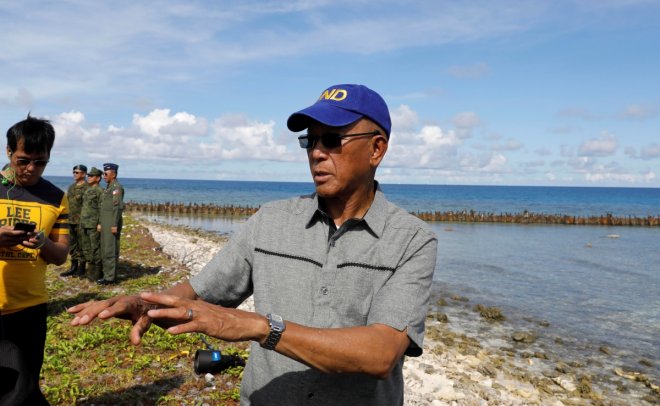
Philippine Defence Secretary Delfin Lorenzana visited a disputed South China Sea island on Friday. This latest move is likely to brush off the challenge by the Chinese military and assert Manila's territorial claim to the strategic region. "This is just a normal visit within our territory, which we believe and we know is (our) territory," the minister told AFP.
China claims most of the South China Sea, through which more than $5 trillion of trade moves annually, while Brunei, Malaysia, Taiwan and Vietnam also have rival claims. Beijing's claims also include Thitu island which Lorenzana visited and the Philippines calls Pag-asa island.
In recent years Beijing has been building up disputed reefs into artificial islands, including on Subi Reef about 26 kilometers from Thitu, which can house military facilities.
Lorenzana said construction would start "within the next few weeks" for a quay on Thitu island. The construction materials will be landed for repairs on an existing airstrip on the largest of nine Philippine-garrisoned outcrops in the Spratly archipelago.
The ministry said that when the military transport plane bearing him and a few local officials of Palawan island were ready to land, the pilots received a warning from Chinese forces on Subi.
The pilots were warned that the aircraft was illegally entering the Chinese territory. This was a routine for all Philippine aircraft landing on the Thitu airstrip since China reclaimed Subi. The minister said his pilots disregarded the warning. "That's their protocol. That's procedural. We also reply that we are flying over Philippine territory," he said.
Lorenzana's visit to Thitu comes more than a week after President Rodrigo Duterte cancelled a scheduled visit to a disputed South China Sea island on June 12 to raise the Philippine flag there. Later, Duterte said that he called off the trip "because we value our friendship" with Beijing.
Duterte's decision to visit the island was a direct challenge to China's sovereignty over the disputed South China Sea – an issue which has kept the Asian superpower hostile for quite some time now. Duterte said Beijing warned him that "there will likely be trouble" if every head of state of contending parties goes to the disputed islands and plant flags.
Reversing the course set by predecessor Benigno Aquino, Duterte has sought to improve his nation's relations with Beijing by adopting a non-confrontational approach over their competing claims to the strategically vital waters believed to sit atop huge oil and gas reserves.
However, Lorenzana said that Duterte was not backing down from his orders for the military to reinforce its installations in the Spratlys, and has allotted 1.6 billion pesos (S$44.8 million) for these. He said both China and Vietnam have long been fortifying their own garrisons on nearby outcrops. "We all know that China is the most powerful country in our neighbourhood, they are economically powerful, also militarily," Lorenzana said. "We are trying manage the issue and talk to them... settle this dispute in the South China Sea."
Meanwhile, as Lorenzana flew to Thitu, there were reports from the Philippine coast guard that China's coast guard fired at a group of Filipino fishermen in another section of the Spratlys. But, there were no casualties during the incident. "(Princess Johann) was reportedly fired upon seven times by a Chinese speedboat with seven Chinese coast guards on board," a Philippine Coast Guard statement said.
When China's Foreign Ministry spokesman Lu Kang was asked about the incident, he said: "I have no information on that. And as you have said, it is unclear who was responsible. China will also need to verify the facts."
"We have always been clear about our position on the South China Sea issue. We are willing to work with the Philippines to deal with any maritime-related issues, to create a conducive environment for the healthy development of our bilateral relations. Since President Duterte's visit to China last year, our bilateral ties have quickly improved. We are making steady progress with our bilateral cooperation in all areas. Overall, both sides are able to build upon the consensus of the two leaders, and are able to manage maritime issues through negotiations and coordination," the spokesman added.









